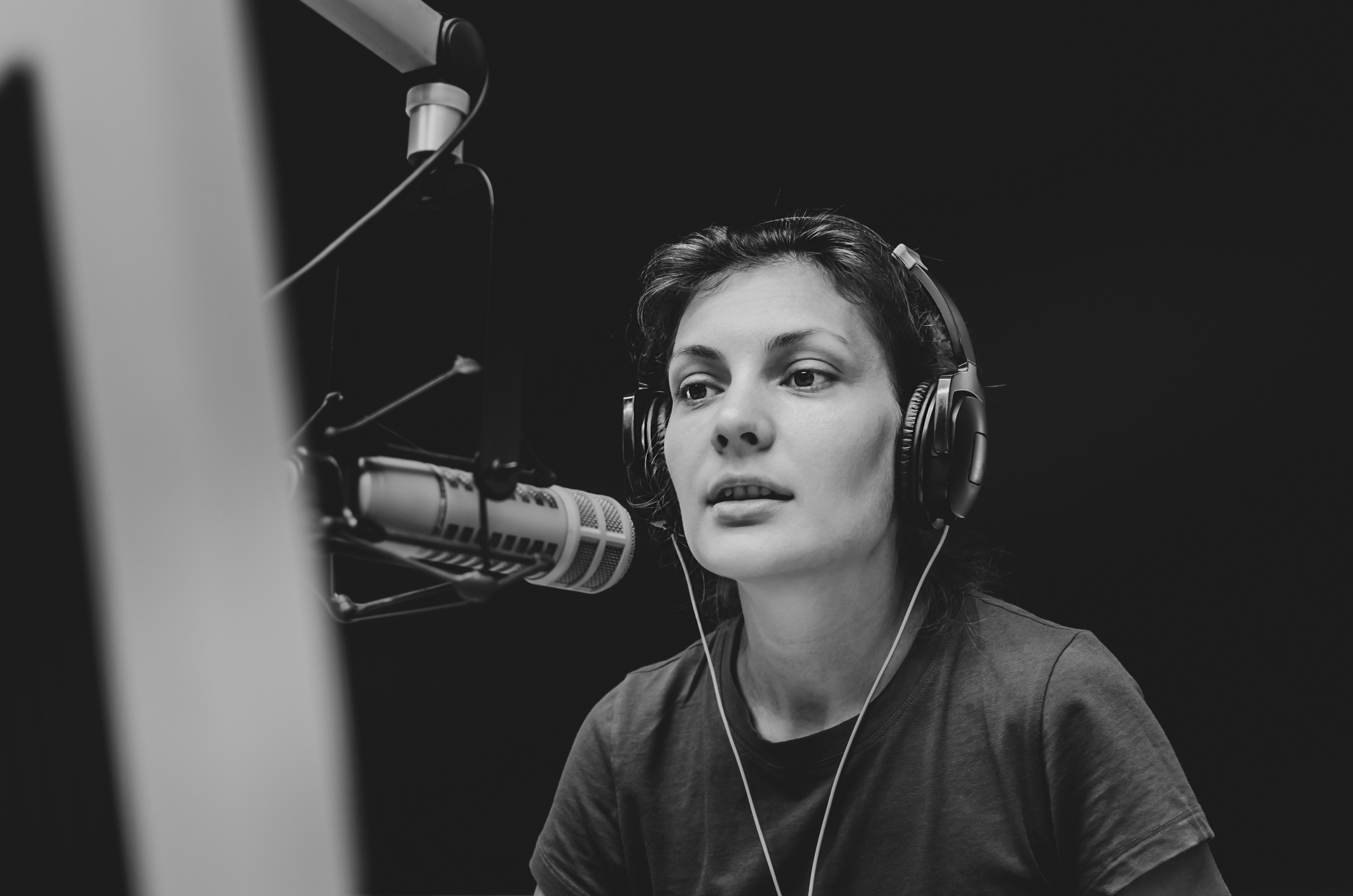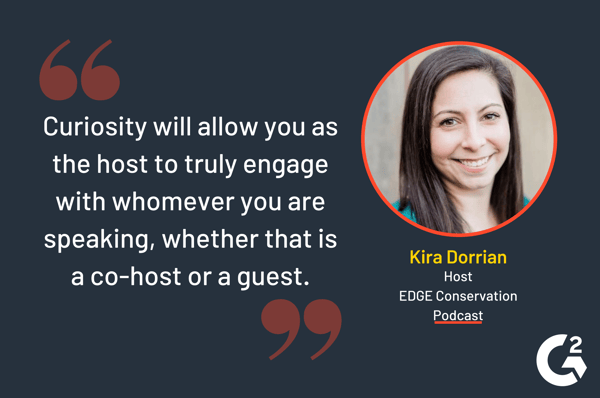May 24, 2019
 by Piper Thomson / May 24, 2019
by Piper Thomson / May 24, 2019

You move your microphone into position, take a deep breath and freeze. What do you say?
Even if you’ve written a podcast script, how you're going to deliver your show is almost as important as the content itself.
With so much advice essentially boiling down to “be yourself”, there’s very little concrete, actionable advice when it comes to puzzling out an effective way to comport yourself when approaching the onerous challenge of hosting your podcast’s first show.
Below you can find tips from veteran podcast hosts who have had ample time to cut their teeth hosting a plethora of different shows. Feel free to jump ahead to a tip that speaks to you:
1. Be prepared
2. Be authentic
3. Focus on specific areas of improvement
5. Be curious
7. Be analytical about the conversation
Sean Johnson, Professor of Innovation at Northwestern University, Kellogg School of Management and Partner at Digital Intent
Though this bit of advice might seem obvious to most, its importance cannot be overstated. Professor Sean Johnson shares his experience:
“I've been hosting 2 seasons so far of The Disruptors, and the thing that's been most helpful for me is pre-interview prep. I deliberately go out of my way to read every article I can find about them, every presentation they've given, read as many social media posts as I can, etc. It allows me to dig below the surface and really dive into the nuances of their areas of expertise. I didn't want my podcast to be 101 or beginner level material but be legit actionable insights that would be tough to get from a quick web search.”
Hosting a podcast, particularly in an interview context, requires as much prep work as you can feasibly provide. If you need more information on how to run a podcast interview, be sure to check out our overview on how to conduct a podcast interview.
Dawn Kuczwara, Host at Leading Questions
While preparation is critical, it’s important to let your own personality shine through in the execution. A good podcast is, among other things, defined by the personality of its host:
“The format is pretty casual for Leading Questions, even though it's technically a professional topic - ie leadership for knowledge workers. We let our personalities show through, and do very little to edit ourselves which means the podcast can take a turn completely off-subject at times, and we're known to use more adult language that you might otherwise hear on another leadership podcast. That's because we really try and focus on answering the questions honestly and from our own experience and don't spend energy altering the way we'd answer. We both rely heavily on our own experience in our answers, as well as research on the subject. So for my part, I spend some time thinking through and making notes about my previous experience as it relates to the question - both in leading others and in my personal life.
Jer and I don't talk about the question beforehand on purpose. This allows us to have a discussion about the subject and express varying opinions based on our own experience. It allows our listeners to hear differing views on a single question. Although we only publish audio, Jer and I use video together so that we can see each other during our discussions. This really facilitates the conversation style of our podcast.”
While you might need more or less preparation than the examples given above, the actual experience and relationship you have with a particular topic is everything when it comes to giving an authentic experience with which the audience can form a relationship.
Ryan Vet, Leadership Speaker and Host of the Dental Experience Podcast
“One of the best things that I did was create lists that I could use during my podcast to spur on my guests and navigate the conversation in a way that helped listeners. The first was having words of affirmation. Instead of uttering the word “interesting” after every comment a guest made, I now have a list of affirming words I can work through to change it up. The next area for improvement was transition phrases. Instead of That's great and now let's talk about... I needed some improvements in my transitions from a guest's phrasing to how I went to the next topic. Polishing those transitions kept the guests alert and engaged and made a much more pleasurable listening experience for the audience.”
This ties into the “preparation” tip given above. A great way to make your podcast feel more natural is to make note of your own tendencies and mark them down in your podcast script before you ever start recording. This will help you catch problems before they have a chance to reach your audience.
Gavin Reese, Former Police Officer, and Thriller Author
Having a memorable way to get new audiences engaged is crucial for any podcast to grow its listener base. This can be done either in the podcast’s intro, or somewhere else in the opening body of your show’s content. Gavin Reese explains:
“My subjects offer dozens of interviews each year. To make *my show* memorable and entice them back, I usually ask some variation of this last question: “If you wake up tomorrow and find yourself murdered, what fictional investigator or revenge artist do you want on the case?” Most laugh, everyone plays along, and my podcast is that much harder to forget.”
This is also an excellent way to establish good energy for your show. Leading with something interesting and surprising will keep people engaged and excited about what you have to say.
Kira Dorrian Host of the EDGE Conservation Podcast
Passion is, of course, a pivotal part of being a good podcast host. But passion doesn't always translate to the exact skills you need. Kira Dorrian highlights the way this can be channelled into something productive:
“I believe the most important skill any podcast host needs is an innate sense of curiosity, not just about the topic you are covering, but also about the world and the people in it. Curiosity will allow you as the host to truly engage with whomever you are speaking, whether that is a co-host or a guest. It will also lend itself to what I believe is the second most important skill: listening. True listening requires space without interjection or the forming of your own next thought. When these two things are put together, a host creates a warm environment and safe space for both their guest or co-host as well as their audience. Finally, a good host needs a sense of humor. Podcasts are a form of entertainment, and we must remember to keep it entertaining!”
The quickest way to ensure the quality of your podcast is to be willing to learn more about the topic you’re covering.

So much of what makes a show meaningful is the journey of discovery that the listener and the host can embark on together.
Joey Held, Digital Manager at INK Communications Co
One of the best things a podcast host can do is to listen. This might seem a little counterintuitive — after all, isn’t it the job of the podcast host to fill the space? — but being purposeful about your listening is crucial for developing the skills you need to be an effective host.
“Listening is so crucial– a guest may take a detour while they're talking, which is not necessarily a bad thing. But it's up to you as a host to keep your ears (and eyes, if the interview is in person) open and decide whether to go down that side path or steer the conversation back on track. That goes for co-hosts, as well. Even if you're flying solo, you can listen to feedback from your audience and make any adjustments as needed. When someone else is on the episode, they're going to play off of you. If you're engaging they will be, too.”
This isn’t just for when you’re recording with someone else. As Joey points out, listening is a skill you should cultivate both during and between your episodes.
Kelly Glover, Podcast Talent Booker and Publicist at The Talent Squad
The final piece off advice from our experts comes from Kelly Glover, who highlights the importance of designing the conversation for their shows.
“A talented podcast host manages their performance and all the intangibles involved in producing a consistent and on-brand show. The secret is conversation design. A seasoned host has the skill to elicit the best out of show guests and co-hosts by managing the content, tone, pace, and structure of the interview.”
This a little different than just preparing a script. You need to make sure you’re aware of the factors listed in the above bit of advice in order to ensure your content is delivered in a way that has the most impact. You don’t want to stumble through a big reveal; make sure you give the big moments of your show the space they need to breathe so that the core idea of your show can really shine through.
Sometimes, you need a little structure to set yourself free. If you follow the advice of our contributors, you’ll be sounding like a natural host in no time at all.
Are you looking for more information on how to get started with podcasting? Check out our complete guide on how to start a podcast!
|
Interested in sharing your insight? Help others in your industry and grow your personal brand by contributing to the G2 learning Hub! Signing up takes just a few seconds and, like the thought-leaders in this article, you can share your knowledge in tech, design, or business development with over 1.5 million monthly readers. |
Piper is a former content associate at G2. Originally from Cincinnati, Ohio, they graduated from Kenyon College with a degree in Sociology. Their interests include podcasts, rock climbing, and understanding how people form systems of knowledge in the digital age. (they/them/theirs)
Podcasting has exploded onto the digital landscape — but that doesn’t mean it’s equally...
 by Piper Thomson
by Piper Thomson
Even the most passionate and driven content creators can feel overwhelmed when faced with the...
 by Piper Thomson
by Piper Thomson
If you’re thinking about making a podcast, you’re going to need to understand what makes a...
 by Piper Thomson
by Piper Thomson
Podcasting has exploded onto the digital landscape — but that doesn’t mean it’s equally...
 by Piper Thomson
by Piper Thomson
Even the most passionate and driven content creators can feel overwhelmed when faced with the...
 by Piper Thomson
by Piper Thomson


.jpg?width=400&name=iStock-1132835815%20(1).jpg)